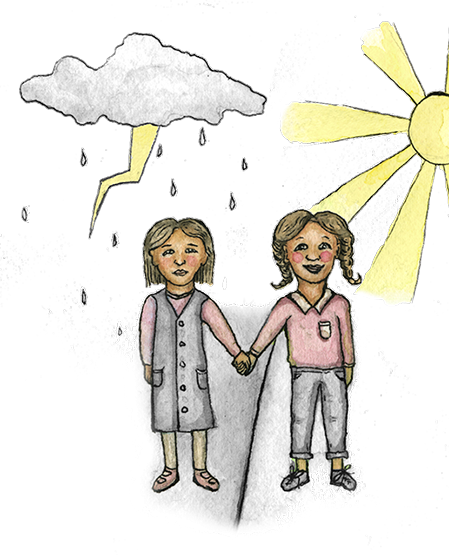
Laboratory for Social-Emotional Development and Intervention Toronto

Promotion of
Healthy Child Development and Flourishing
 Research:
Research:
Supporting Prosociality and Resilience in Newcomer Transitions (SPRINT)
With many refugees arriving in Canada, it is important to understand how to best help refugee children and families meaningfully integrate and resettle. What are refugee children’s and caregivers’ experiences surrounding support, positive development, and challenging situations during and after their transition? What personal characteristics, interpersonal experiences, and social settings make the transition easier for some and harder for others? How do these factors affect refugee children’s healthy development? SPRINT is a community-based project that addresses these questions. With a sample of newcomer children from early childhood to adolescence and their caregivers, this project collects information on children’s emotional and social development, mental health, and protective factors using a multi-method, multi informant approach. Overall, our objective is to promote the mental health and development of refugee children and their caregivers. Building upon collaborative work with our community partners, we are developing and implementing an intervention approach for refugee caregivers and practitioners who work with refugee families. This includes training from our team of clinical and child development specialists to promote caregiving strategies and support, coping skills, and positive child development within the context of a resettlement experience. We are also working with the community to implement a knowledge development and exchange strategy to promote public awareness of our findings and expand the reach of our work
(⇾ https://kdehub.ca).
This research pillar focuses on translating and applying the knowledge gained from our pathways pillar into practice and policy initiatives that promote positive development and mental health in all children. It includes the following ongoing projects:
Research and Practice Partnership: Building Awareness and Increasing Social-Emotional Capacity in the Early Years (RAISE)
Child emotional and behavioural challenges are significant health issues in Canada. This project aims to address these challenges by promoting children’s social-emotional development and mental health (e.g., emotion regulation, sympathy, and self-reflection) using a clinical-developmental and trauma-informed approach. RAISE is part of a multidisciplinary collaboration between our research team and community partners in the Early Years sector in the Peel region (e.g., practitioners, service providers, and policymakers) and nationally. The goals of the project are to describe and evaluate: 1) the current mental health, social-emotional development, and needs of children and caregivers living in the Peel region and 2) the efficacy of a research-based training initiative using online videos and virtual live group sessions delivered to caregivers and Early Years sector practitioners. The training is aimed at supporting caregivers’ and practitioners’ ability to promote social-emotional capacities and mental health in young children, the caregiver–child relationship, and caregiver mental health. The overarching objective is to show that our research-informed social-emotional and clinical training approach can be adapted to diverse settings with impact. This interdisciplinary, boundless partnership also provides an innovative venue to increase communication and collaboration between research, practice, and policy leaders, and to assess the strengths and challenges related to the implementation of our research-based training initiatives in the Peel region and nationally.
NFRF Project
Black and Indigenous communities in Canada experience various inequities such as service barriers, mental health, and disproportionate pandemic-related challenges due to underrepresentation and systemic racism. These inequities can have a negative impact on the mental health and well-being of Black and Indigenous children and families. Research indicates that social-emotional capacities (e.g., emotion regulation, relationship building, and empathy) can promote positive mental health amidst adversity. This community-based project aims to build upon past research by incorporating the voices of Black and Indigenous communities throughout each stage of the research process because initiatives may be more successful when they are guided by the voices and perspectives of the communities they aim to serve. Specifically, this project tests a community-led training approach that aims to equip early years and childcare (EYCC) service providers with the capacities to support the social-emotional development and mental health of Black and Indigenous children and families in Peel. To achieve this, the project will: 1) conduct a needs assessment by implementing focus groups with Black and Indigenous caregivers and parents to identify areas of strength and potential in these communities, 2) apply the results of the focus groups to adapt our social-emotional training in consultation with Black and Indigenous community advisor members, 3) deliver and evaluate the training with local EYCC service providers in collaboration with community advisor members. Driven by strong partnerships, decades-long research, and community participation, this innovative project highlights the importance of fostering the healthy development of Black and Indigenous children.
Contact
Media